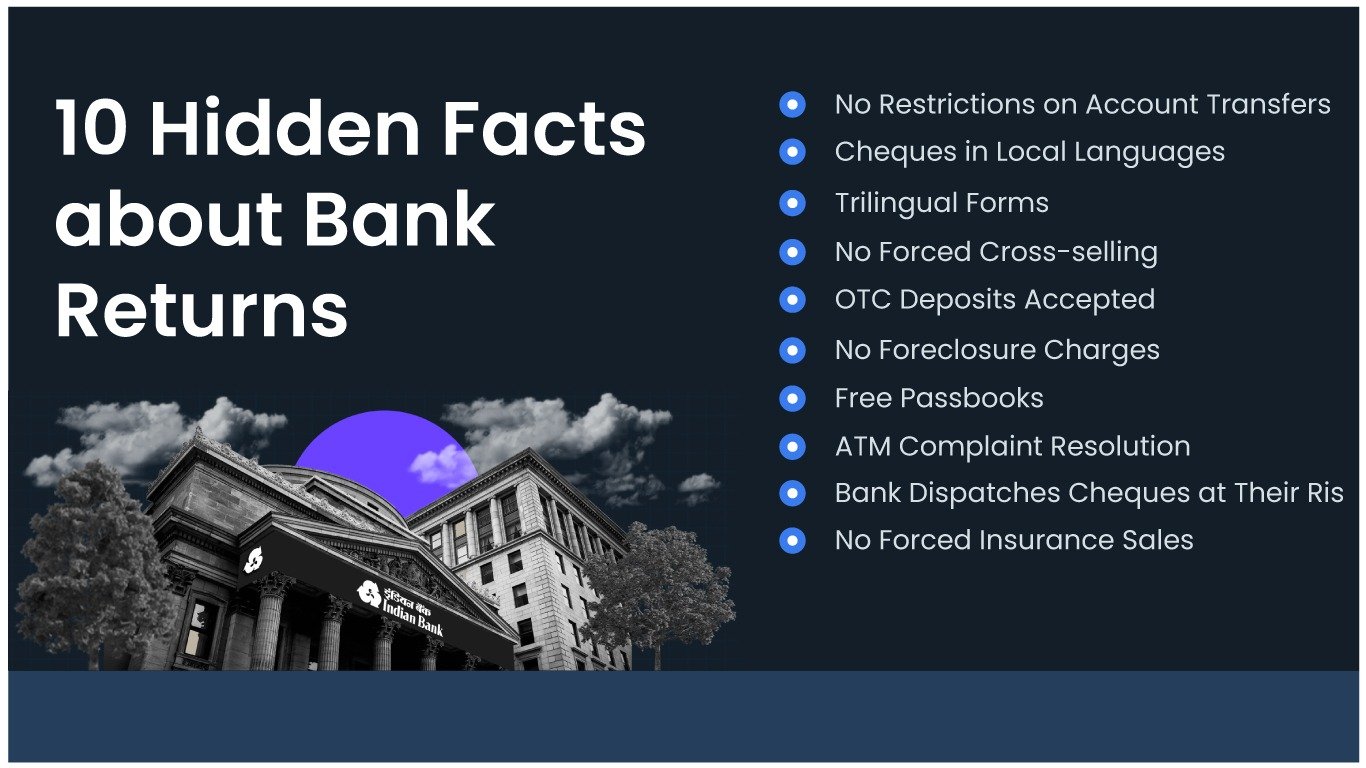10 Hidden Facts about Bank Returns
Let’s be honest — when it comes to managing money, most of us in India still have a lot of faith in our banks. Fixed deposits, savings accounts, recurring deposits — these have been the go-to investment choices for generations.
Why? Because they feel safe. Familiar. Risk-free.
But here's the catch — while banks are excellent for storing your money, they’re not always upfront about what you're actually earning in return. There are a lot of little things about “returns” that banks won’t bring up unless you ask the right questions.
In this blog, we will break down the 10 things about returns that banks rarely, if ever, tell you. If you care about growing your wealth and not just saving it, keep reading — this might just change the way you look at your money.
1. What You See (on Paper) Isn't What You Get (in Reality)
Banks will tell you your FD gives you 6.5% interest. Sounds decent, right?
But after accounting for inflation and tax, your real return might be closer to 2% or even less.
Think about it — if your money grows at 6.5% but the cost of living increases by 6% a year, are you really getting ahead?
Nope. You're just about breaking even. This is the part banks quietly skip.
2. The Taxman Takes His Share — But Banks Don’t Warn You
Here's something most people don’t realise until it's too late — the interest you earn from fixed deposits and savings accounts is fully taxable.
So if you're in the 20% or 30% tax bracket, your 7% FD could effectively earn you just 4.9% or even lower.
Banks never mention this when you open an FD. It's up to you to calculate your post-tax return.
3. Your Savings Account Interest is... Meh
Ever noticed how you barely earn anything from your savings account? That’s because the average interest is around 3-4% — and that too on your average monthly balance, not the full amount.
So if you thought your ₹1 lakh would give you a good monthly return — it won’t. You might earn just a few hundred rupees per month. Nothing life-changing.
4. They Won’t Compare Themselves With Better Options
Why would they? Banks won’t tell you that investing in a PPF, mutual fund, or RBI bond might give you better returns with similar or better safety.
Their job is to sell their own products — not guide you to the best possible investment out there.
So unless you do the research, you’ll probably end up missing out on smarter choices.
5. Breaking Your FD? Say Goodbye to Full Returns
Most people think they can withdraw their FD any time. And yes, you can — but you’ll probably lose out on the promised interest rate.
Banks charge a penalty or adjust your interest rate downward if you withdraw early. That 7% could suddenly become 5.5%.
Ask your bank about this before you lock in your money.
6. The Interest Rates They Show You? Not for Everyone
Here’s a sneaky one — the “attractive” FD rates advertised outside the branch or on the website? They often apply only to specific tenures like 5 years.
So if you’re planning to open a 1-year FD, you might get a lower rate. But unless you ask, they won’t mention it.
Always check what rate applies to the exact tenure you’re choosing.
7. How Interest Is Compounded Matters (But They Don't Tell You That)
You might have seen this term: "Interest compounded quarterly". Sounds technical, right?
But it makes a big difference.
If Bank A compounds interest quarterly and Bank B does it annually, your money grows faster with Bank A — even if both offer the same rate.
Banks don’t really explain this unless you dig deep. But it affects your final return.
8. Auto-Renewal = Lazy Returns
Most people forget to close or reinvest their FD when it matures. So what do banks do?
They automatically renew it — sometimes at a much lower rate than what you originally signed up for.
No reminders, no advice, nothing.
So you could end up locking your money at a poor rate for years without realising it.
9. They Don’t Mention Government Schemes That Beat FDs
There are government-backed schemes like Public Provident Fund (PPF), Sukanya Samriddhi Yojana (SSY), and Senior Citizens Savings Scheme (SCSS) that offer better returns, tax benefits, and more safety.
But your bank won’t highlight these unless you specifically ask — because they don’t earn commissions on them the way they do with their own products.
Sad but true.
10. Banks = Safe. But Safe Isn’t Always Smart
Don’t get me wrong — banks are great for parking emergency funds. But when it comes to building wealth?
You have to think beyond savings accounts and FDs.
If you’re not at least partially invested in mutual funds, equity, or long-term tax-saving instruments, you’re leaving money on the table.
Banks won’t tell you this, because it’s not in their business interest to do so. But if you want your money to actually grow, you need to explore more.
So, What Should You Do?
Let’s quickly recap:
- Calculate post-tax returns
- Beat inflation, not just earn interest
- Explore alternatives like PPF, mutual funds, and RBI bonds
- Avoid auto-renewal traps
Ask your bank the right questions
Don't get stuck in the "safe but slow" mindset. It’s time to get smart with your money — because if you don’t take charge of your finances, someone else will (and they probably won’t have your best interests in mind).
